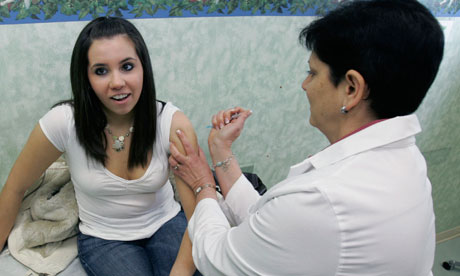
Schoolgirls should be vaccinated against Britain's commonest sexual infection when they receive their cervical cancer jabs, leading doctors are demanding.
Sexual health specialists want all 12- and 13-year-old girls to be immunised against genital warts at the same time as they get a jab protecting them against cervical cancer.
The call has come from the British Association of Sexual Health and HIV, which represents clinicians who staff genito-urinary clinics dealing with people who develop sexually transmitted infections such as herpes and chlamydia. They say the pain and misery involved in getting genital warts is so great that the routine vaccination of girls is needed to tackle the condition, which affects about 200,000, mainly young, people every year.
Since 2008, 12- and 13-year-olds have been offered a series of three jabs to vaccinate them against cervical cancer. About 80% receive the injections, which offer 95% to 100% protection against the human papilloma virus (HPV), which causes the disease. HPV also causes genital warts, as well as conditions such as skin warts, verrucas and several other rarer cancers.
The vaccine girls currently receive, called Cervarix, only protects against cervical cancer. But new research shows that the vast majority of sexual health doctors want that replaced with a two-in-one vaccine called Gardasil, which is more expensive than Cervarix. Cervarix protects against strains 16 and 18 of HPV, but Gardasil covers those and also strains 6 and 11, which cause genital warts.
In a survey of the association's members, 93% said they would choose Gardasil rather than Cervarix for their own daughter or advise a friend to get it for their daughter.
Among doctors who had teenages daughters, 61% had already paid for them to receive a course of Gardasil injections privately, while some had done so even after their daughter had had the cervical cancer jab at school.
"The misery of genital warts could be largely eradicated if young people were given the dual-purpose HPV vaccine," said Dr Liz Foley, a consultant in genito-urinary and HIV medicine at the Royal South Hants Hospital in Southampton who organised the poll of the group's 520 members. Foley paid £450 last year for her now 14-year-old daughter to receive Gardasil at the same time as her classmates were getting the Cervarix jabs, and will do the same with her other daughter, who is 12.
The association is urging the Department of Health to ditch Cervarix in favour of Gardasil when the HPV vaccine strategy is reviewed in a few months' time. "There would be a financial cost to switching to Gardasil, but it would offer the additional benefit of stopping genital warts in our young people, so it's worth the extra money," said Foley.
The change would save the NHS £35m a year because many fewer people would need to be treated for genital warts and waiting times at sexual health clinics would be reduced, she added.
Genital warts is the UK's most common viral sexually transmitted infection. The highest rates are among women aged 16-19 and men aged 20-24. Some 91,000 people of all ages were diagnosed with it for the first time and another 53,000 saw the infection recur. But these figures only cover sufferers seen at clinics and not those treated by GPs, so the real total is likely to be even higher.
Doctors will take their campaign for a switch to the two-in-one jab to parliament this week when they lobby MPs on Wednesday.
The last government was "foolhardy and shortsighted" not to choose Gardasil when it began the HPV vaccination programme, Foley believes. "That was a missed opportunity to improve the sexual health of teenagers," she said.
Most other European countries opted for the dual-purpose vaccine, with only the Netherlands and Italy making the same choice as the UK.
Dr Clare Gerada, chair of the Royal College of GPs, backed the association's call. "Yes, girls should be given the dual-purpose vaccine. It makes sense to immunise them against both. Genital warts are grim and lifelong."
The Department of Health hinted that it was considering making a change. It had chosen Cervarix in 2008 "as it offered the NHS the best overall value", a spokeswoman said. "Subsequently, new research has been published that this vaccine provides cross-protection against more of the strains that cause cervical cancer, thus helping to prevent even more of the disease." The department is updating the way it calculates the cost-effectiveness of the HPV vaccine as it prepares to buy new supplies later this year for the latest immunisation programme, she added.

